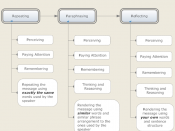November 28, 2001
Listening Skills Analysis
The development of effective listening skills is invaluable for any person to promote successful communication within relationships. These skills are especially important for occupational therapists, in order to be client-centered in their communication with clients. The opportunities for instruction and practice of active listening skills within the Therapeutic Intervention I course has been extremely helpful in my personal development of such skills. Prior to entering this course, I was not very aware of my own listening skills. Through the course of the semester, I have gradually enhanced these skills and my awareness of them. I can now check-in with myself during a conversation and apply, modify, and improve listening skills as needed. Now that the semester has concluded, looking back at my listening skills, I see progress, but also recognize the need for continual improvement and modification of these skills throughout the rest of my personal and professional life.
Several strengths in listening skills have been personally developed this semester. By following the SET and SOLER acronyms outlined in class, I provide empathy and attend to conversations well. I illustrated this strength during my group project, and hope to incorporate these skills outside the classroom. These techniques help your peer or client feel understood and comfortable expressing themselves to you, the listener. I also provide effective reflection of feeling and content to the speaker, which lets them know that I understand where they are coming from. I also believe that I have developed the ability to use primary accurate empathy, to check for feelings and content expressed by
someone. However, I find it much harder to incorporate advanced accurate empathy into conversations. It is sometimes difficult as the listener to recognize the hidden thoughts and feelings behind what someone is conveying.
Stephen Covey once...


